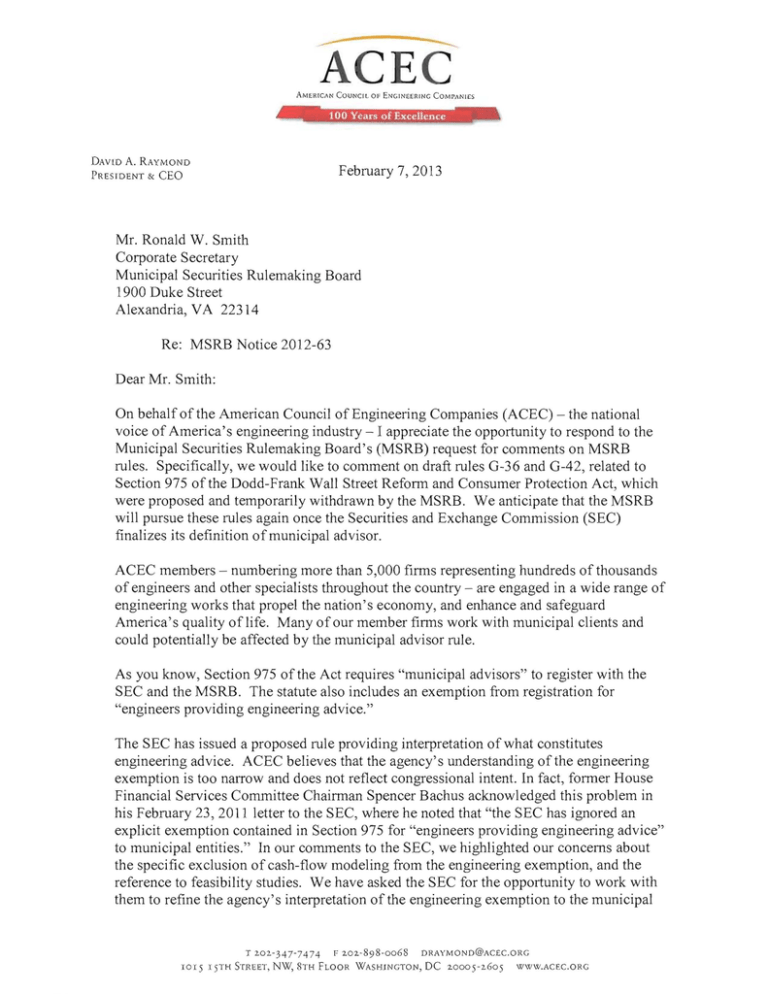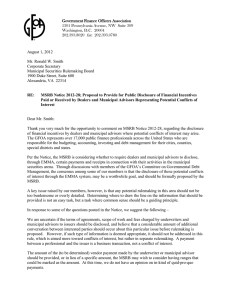Document 10507605
advertisement

---ACEC ----AMERICAN COUNCIL OF ENGINEERING COMPANICS 100 Years of Excellence -­ DAVLD A. RAYMOND PRESIDENT & February 7, 2013 CEO Mr. Ronald W. Smith Corporate Secretary Municipal Securities Rulemaking Board 1900 Duke Street Alexandria, VA 22314 Re: MSRB Notice 2012-63 Dear Mr. Smith: On behalf of the American Council of Engineering Companies (ACEC) - the national voice of America's engineering industry - I appreciate the opportunity to respond to the Municipal Securities Rulemaking Board's (MSRB) request for comments on MSRB rules. Specifically, we would like to comment on draft rules G-36 and G-42, related to Section 975 of the Dodd-Frank. Wall Street Reform and Consumer Protection Act, which were proposed and temporarily withdrawn by the MSRB. We anticipate that the MSRB will pursue these rules again once the Securities and Exchange Commission (SEC) finalizes its definition of municipal advisor. ACEC members - numbering more than 5,000 firms representing hundreds of thousands of engineers and other specialists throughout the country - are engaged in a wide range of engineering works that propel the nation's economy, and enhance and safeguard America's quality of life. Many of our member firms work with municipal clients and could potentially be affected by the municipal advisor rule. As you know, Section 975 of the Act requires "municipal advisors" to register with the SEC and the MSRB. The statute also includes an exemption from registration for "engineers providing engineering advice." The SEC has issued a proposed rule providing interpretation of what constitutes engineering advice. ACEC believes that the agency's understanding of the engineering exemption is too nalTOW and does not reflect congressional intent. In fact, former House Financial Services Committee Chairman Spencer Bachus acknowledged this problem in his February 23, 2011 letter to the SEC, where he noted that "the SEC has ignored an explicit exemption contained in Section 975 for "engineers providing engineering advice" to municipal entities." In our comments to the SEC, we highlighted our concerns about the specific exclusion of cash-flow modeling from the engineering exemption, and the reference to feasibility studies. We have asked the SEC for the opportunity to work with them to refine the agency's interpretation of the engineering exemption to the municipal T 2.02.-347-7474 F 202-898-0068 DRAYMOND@ACEC.ORG 1015 15TH STREET, NW, 8TH FLOOR WASHINGTON, DC 20005-2.605 WWW.AC£C.ORG advisor registration regime so that it more clearly reflects congressional intent and the nature of professional engineering work. Depending on the interpretation in the SEC's final rule, certain engineers and engineering firms may need to register as municipal advisors. There is a potential conflict for engineers that register as municipal advisors and must therefore assume the fiduciary duties outlined in MSRB draft rule G-36. The draft rule states: "In the conduct of its municipal activities on behalf of municipal entities, a municipal advisor shall be subject to a fiduciary duty, which shall include a duty ofloyalty and a duty of care." A duty of loyalty requires a municipal advisor to deal honestly and in good faith with the municipal entity and to act in the municipal entity's best interests without regard to financial or other interests of the municipal advisor. While this duty may not, in the normal course of events, cause any conflicts for the engineer, there are circumstances when such duties could come into direct conflict with the engineer's professional and ethical responsibilities. The ethical duty of engineers to hold paramount the safety, health, and welfare of the public is delineated in the regulations of the various state licensing boards for professional engineers. For example, the Commonwealth of Virginia's Board for Architects, Professional Engineers, Land Surveyors, Certified Interior Designers, and Landscape Architects' current regulations provide as follows: The primary obligation ofthe professional is to the public. The professional shall recognize that the health, safety, and welfare ofthe public are dependent upon professional judgments, decisions, and practices. If the professional judgment of the professional is overruled under circumstances when the health, safety, and welfare, or any combination thereof, of the public are endangered, the professional shall inform the employer and client of the possible consequences and notify appropriate authorities. The same obligation is reflected in the codes of ethics of private professional associations such as ACEC and the National Society of Professional Engineers (NSPE), as well as related professional associations such as the American Institute of Architects (AlA). In the course of providing professional engineering services to a client, it is conceivable that circumstances could arise in which a professional engineer would find himself or herself facing a conflict between breaching the fiduciary obligations of a municipal advisor and violating the ethical obligations imposed upon the professional engineer under applicable state licensing board regulations. In such a circumstance, it would be detrimental to the health, safety, and welfare of the public to prioritize the professional engineer's fiduciary duty to his or her client. By failing to address such a conflict, MSRB draft rule G-36 does not serve the interests of the public, which looks to professional engineers to solve many of society's problems. In addition to conflicts related to engineering codes of ethics, the same fiduciary and duty of loyalty provisions can be in conflict with normal expectations when engineering firms are involved in demand and revenue forecasting. An example would be traffic and revenue forecasts for a toll facility. In that role, the engineer is expected to operate independently of the client as he or she prepares estimates of revenue. These forecasts may be at odds with client expectations, yet this "arm's length" relationship is essential to the credibility of the study product. In this role, engineers are not actually serving as 'advisors' to the client but rather as independent forecasters providing a critical component to the design process. We urge you to carefully consider these concerns when the MSRB re-proposes draft rule G-36, and to ensure that the rule accommodates the specific obligations to public safety and welfare of professional engineers. ACEC would also like to comment on MSRB draft rule G-42, which proposes to place conditions on the political activity of municipal advisors that are similar to those in place for securities dealers. Under the draft rule, registered municipal advisors that make political contributions to municipal officials and candidates would be prohibited from working for those municipalities for a two-year cooling-off period, with the limited exception of de minimis contributions. In addition, donations made by a registered municipal advisor to political action committees or conduits could also trigger the cooling-off period due to the application of the draft rule to indirect political giving. Finally, the cooling-off period could be triggered by the look-back provision in the draft rule, which applies to contributions made within two years prior to an individual's employment as a municipal advisor. ACEC agrees with the MSRB that a fair and transparent municipal procurement process is essential, and the integrity of the municipal marketplace must be protected. However, ACEC also believes that engineers should not be excluded from the political process. Compliance with draft rule G-42 by municipal advisor firms will require extensive education of employees regarding the ramifications of personal political contributions on the firm's ability to work for municipal governments. It will be extremely challenging for large engineering firms that employ thousands of people to be aware of all individual donations. Small firms, in which engineers and other employees often take on multiple roles, may find compliance difficult due to a lack of personnel resources. The look-back provision in particular could be very problematic for engineering firms that are registered as municipal advisors. In general, the Department of Labor does not favorably view questions during the hiring process that are not directly related to the job itself. Employers may be reluctant to ask about political contributions due to the risk that the hiring process would be viewed as discriminatory. However, not asking about political contributions could trigger the cooling-off period and make the firm ineligible to work for certain municipalities for two years. This concern is especially relevant in the engineering industry because some engineering firms will not fall under the definition of municipal advisors, and a professional engineer could easily move between registered and non-registered firms. ACEC also believes that draft rule G-42 is not sufficiently clear with respect to when contributing to a political action committee would constitute control. ACEC members choose to participate in ACEC/PAC and the PACs of our state member organizations in order to support the election of officials who understand the engineering industry. We urge the MSRB to balance that legitimate goal with the need to protect the municipal marketplace. We respectfully request that the MSRB consider the issues we have raised. Thank you for your consideration of our comments, and we look forward to working with the MSRB on these issues as the rulemaking process moves forward. Sincerely, David A. Raymond President & CEO
